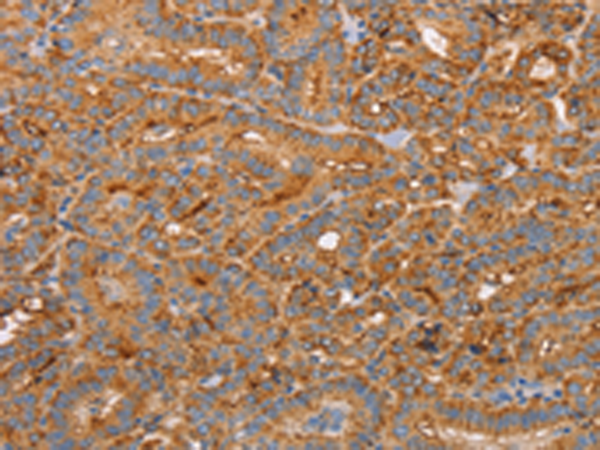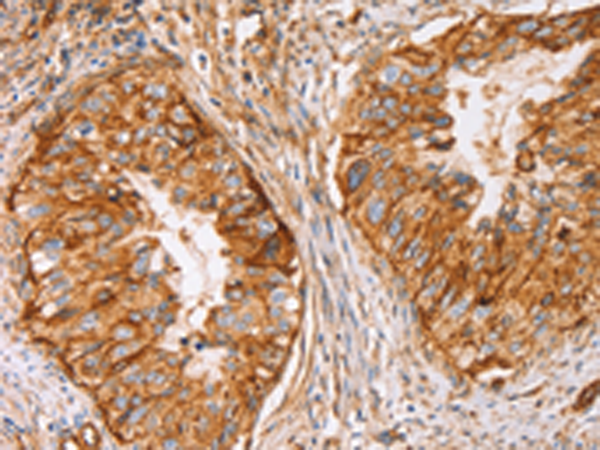


| WB | 咨询技术 | Human,Mouse,Rat |
| IF | 咨询技术 | Human,Mouse,Rat |
| IHC | 1/100-1/300 | Human,Mouse,Rat |
| ICC | 技术咨询 | Human,Mouse,Rat |
| FCM | 咨询技术 | Human,Mouse,Rat |
| Elisa | 1/2000-1/10000 | Human,Mouse,Rat |
| Aliases | 1F5; EJ16; EJ30; EL32; G344; MIN1; MIN2; MIN3; MIRL; HRF20; MACIF; MEM43; MIC11; MSK21; 16.3A5; HRF-20; MAC-IP; p18-20 |
| WB Predicted band size | 14 kDa |
| Host/Isotype | Rabbit IgG |
| Antibody Type | Primary antibody |
| Storage | Store at 4°C short term. Aliquot and store at -20°C long term. Avoid freeze/thaw cycles. |
| Species Reactivity | Human |
| Immunogen | Synthetic peptide of human CD59 |
| Formulation | Purified antibody in PBS with 0.05% sodium azide and 50% glycerol. |
+ +
以下是关于CD59抗体的3篇代表性文献摘要信息:
1. **文献名称**:*"Isolation of a human erythrocyte membrane glycoprotein with decay-accelerating activity for C3 convertases of the complement system"*
**作者**:Davitz, M.A. et al.
**摘要**:该研究首次从人红细胞膜中分离出CD59(当时称MACIF),证实其通过抑制补体C5b-9复合物(MAC)的形成保护细胞免受补体介导的溶解,为后续抗体研究奠定基础。
2. **文献名称**:*"The role of CD59 in complement regulation and its potential as a therapeutic target"*
**作者**:Merry, A.H. et al.
**摘要**:探讨CD59在补体调控中的分子机制,开发特异性单克隆抗体阻断CD59功能,体外实验显示抗体可增强补体系统对肿瘤细胞的杀伤,提示其治疗潜力。
3. **文献名称**:*"Anti-CD59 antibodies enhance complement-mediated cytotoxicity in chronic lymphocytic leukemia"*
**作者**:Fishelson, Z. et al.
**摘要**:研究抗CD59抗体在慢性淋巴细胞白血病(CLL)中的应用,证明抗体可通过抑制CD59的补体抑制功能,增强补体依赖的细胞毒性,为靶向治疗提供依据。
4. **文献名称**:*"Paroxysmal nocturnal hemoglobinuria: CD59 antibodies and their functional consequences"*
**作者**:Hillmen, P. et al.
**摘要**:分析阵发性睡眠性血红蛋白尿症(PNH)中CD59缺失的病理机制,并评估抗CD59抗体在诊断和恢复补体调控中的潜在应用价值。
(注:以上内容基于领域内典型研究方向简化概括,实际文献标题/作者可能有差异,建议通过PubMed等数据库核对具体文献。)
CD59. a glycosylphosphatidylinositol (GPI)-anchored membrane protein, is a key regulator of the complement system. It inhibits the formation of the membrane attack complex (MAC) by binding to C8 and C9 during complement activation, thereby protecting host cells from unintended complement-mediated lysis. CD59 is broadly expressed on various cell types, including erythrocytes, endothelial cells, and immune cells.
CD59 antibodies are tools developed to detect or modulate CD59 activity. Monoclonal antibodies targeting CD59 are widely used in research to study its expression patterns, functional roles in immune regulation, and involvement in diseases. For instance, reduced CD59 expression is linked to paroxysmal nocturnal hemoglobinuria (PNH), where GPI anchor deficiency leads to complement-driven hemolysis. Conversely, overexpression of CD59 in certain cancers is associated with immune evasion, as it shields tumor cells from complement-dependent cytotoxicity (CDC).
Therapeutic CD59 antibodies are explored for clinical applications. Blocking antibodies may enhance complement-mediated tumor cell killing or improve the efficacy of antibody-based therapies. Conversely, recombinant CD59 or antibody-drug conjugates aim to restore CD59 function in deficiency disorders. Challenges include avoiding off-target effects and overcoming CD59’s antigenic modulation in pathological conditions.
Overall, CD59 antibodies serve as critical reagents in both basic research and translational medicine, bridging insights into complement biology and therapeutic innovation.
×